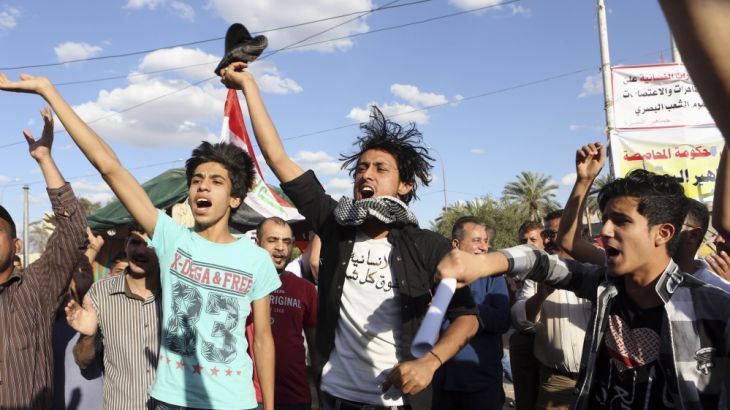Iraqis protest as political deadlock deepens
Third attempt to approve new cabinet fails after dissenting MPs continue attempts to replace the speaker of parliament.

Protesters have taken to the streets in Baghdad to demand a new government, after the Iraqi parliament cancelled its third session in a week to discuss political reforms.
Saturday’s session was scrapped because “parliament couldn’t be secured” by security forces, said a statement from the office of the speaker, Salim al-Jabouri, whose position is under threat as some legislators are seeking to replace him.
Keep reading
list of 4 itemsIraq PM asked to resign amid Basra unrest
Iraq vows ‘severe’ response after attack on Iran consulate
Deadly Basra clashes as government office torched
The political crisis centres around divisions over a plan by Haider al-Abadi, the prime minister, to bring technocrats into cabinet in a bid to check corruption.
![The political crisis centres around divisions over a plan by Abadi to bring technocrats into his cabinet [Reuters]](/wp-content/uploads/2016/04/aa386cdd9cfe46ecb582ee8b49b21a11_18.jpeg)
On March 31, Abadi presented a list of independent professionals whom he hoped could free ministries from the grip of dominant political groups.
But under pressure from leading politicians, he drafted a second list this week based on party links.
The modified list, which Abadi had planned to present for a vote, prompted a sit-in by MPs who say it will allow corruption to continue to flourish.
Al Jazeera’s Jane Arraf, reporting from Baghdad, said if the reforms are actually put in place, it will be the most significant development in Iraqi politics since 2003.
“The political system created after Saddam Hussein was toppled distributed power among Shia, Sunni and Kurdish political blocs. It has created a government that many Iraqis feel serves politicians but not the people,” she said.
Power distribution
The dissenting MPs, who accuse the speaker, Jabouri, of blocking reforms, said that they would meet on Monday to elect a new assembly leader.
The protesters include followers of influential Shia cleric Muqtada al-Sadr, who on Saturday issued a statement asking all the ministers to immediately resign, even those in Abadi’s Dawa party.
Sadr pledged to start protests in 72 hours if the nation’s leaders failed to vote on a technocrats’ cabinet.
“If these conditions are not met then let it be known that the people will decide,” he said in a handwritten statement.
Earlier this week, a parliamentary session degenerated into a massive brawl with shoving, shouting, and water bottles thrown.
READ MORE: Iraq’s new government – Not exactly a breakthrough
The UN has called on Iraqi leaders to resolve the political crisis, warning that instability could jeopardise the fight against the Islamic State of Iraq and the Levant (ISIL, also known as ISIS) group, which still controls much of northern and western Iraq.
“The only party that benefits from the political divisions and chaos … is Daesh,” said the UN’s acting head of mission to Iraq, Gyorgy Busztin, using the Arabic acronym for ISIL.
The cost of the war against ISIL, along with the plunge in the price of oil – which accounts for 95 percent of Iraq’s revenues – have caused an economic crisis, adding fresh urgency to calls for reform.
Iraqi officials predict a budget deficit of more than $30bn this year.
![The UN has warned Iraq' politicians that instability could jeopardise the fight against the ISIL [AP]](/wp-content/uploads/2016/04/0907336cffd84a28a4e73e03aa7b1cfc_18.jpeg)